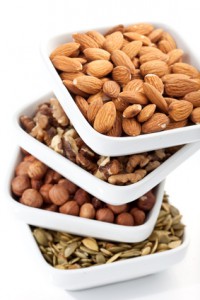Q:I am nuts about nuts! They make great portable snacks. Are there any that are better than others? Can I overdo nuts?

A:
Generally speaking, nuts can make a great snack when eaten in moderation. Nuts are high in magnesium, zinc, fiber and unsaturated fats and low in carbohydrates. They are also high in monounsaturated fats, which has been shown in some studies to protect against heart disease. In some studies, nuts have been shown to help lower LDL cholesterol as well.
Nuts are high in total fat and calorie content, so serving size matters. It is VERY EASY to get carried away eating nuts and dramatically increase your caloric intake without even knowing it. I dont recommend being super stringent about food, but nuts are one place you need to be more careful. They are very easy to count, so do that whenever possible. I like 100 calorie packs of almonds to keep in with me for a quick, portable snack. Here are a few of my favorites:
Cinnamon Brown Sugar Almonds 100 Calorie Packs. I have only found these on Amazon.
Dark Chocolate Roasted Almonds 100 Calorie Packs. Target carries these.
I get asked most often about the difference between almonds and peanuts. Most experts recommend almond butter over peanut butter for its superior health benefits. Almonds are considered alkaline while peanuts are categorized as acidic. Peanuts rate very high in acidity. Creating an alkaline environment is very important in the body for immunity and metabolism.
When choosing which nut butter to use, consider this. Almond butter has 26%, 3% more Iron, more Vitamin E, and 7% more Calcium. Almond butter has 50% more monounsaturated fat than peanut butter and about 25% less saturated fat. It’s higher in magnesium, phosphorus, potassium and antioxidants. If you are going to choose a peanut butter, make sure you choose one that has no hydrogenated oils. That is code for trans fat. Even if it says trans fat free, it can still contain trans fats, so look on the ingredients list for hydrogenated oils. Almond butter contains no trans fats.
The health benefits of salmon are very similar to those of nuts. If you have a nut or seed allergy, try salmon to achieve the same result.
The FDA currently recommends about 1.5 oz. of nuts per day. Typical serving size listed on packaged nuts is 1 oz. and varies greatly by the particular nut you are eating.
- Almonds (24 per 1 oz. serving) High in vitamin E, which has been linked to the prevention of heart disease and cancer
- Walnuts (14 per 1 oz. serving) Highest in omega 3 fatty acids
- Peanuts (28 per 1 oz. serving) Not really a nut, but a legume. They are a good source of B3(healthy skin), zinc and magnesium (renewing tissue), and potassium (muscles)
- Cashews (15 per 1 oz. serving) Rich in selenium, magnesium, phosphorus, and iron
- Pistachios (45 per 1 oz. serving) About the same nutritional benefits, but you get to eat many more for the same calories.
- Seeds Flax, hemp, sunflower, and chia seeds have similar benefits to nuts.
BEWARE OF NUTELLA! Many think Nutella is just another nut butter, but it is not. It has 3 times as much sugar than other nut butters and contains more sugar and palm oil than actual nuts. Check your labels. The actual NUT should be your first ingredient.